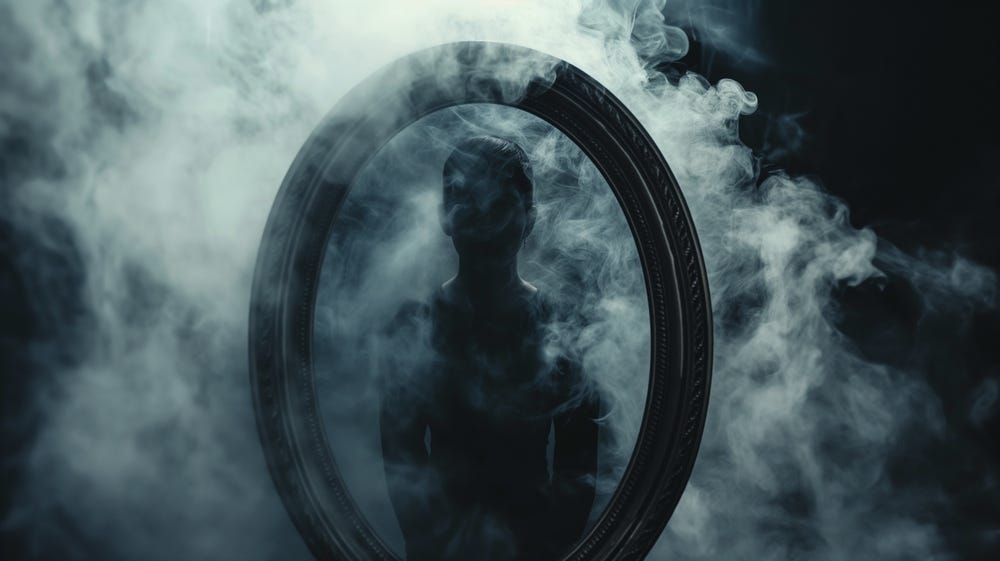Ivy League Illusion, Part I
The Face in the Mirror
I didn’t do drugs. At least, I was pretty sure I didn’t. So I must have been going crazy.
Fortunately or unfortunately, depending upon how I looked at it, my insanity wasn’t apparent to anyone around me—not yet, anyway. But I figured it was only a matter of time before someone else found out that I was hallucinating.
On paper, I had the perfect life. At the risk of sounding incredibly arrogant, I was attending Harvard on a full scholarship. I was still a freshman but so far a straight-A student. I was also athletic enough to qualify for Harvard’s heavyweight rowing team. Rowing was hands-down one of the toughest sports there was, and I was proud to belong to a team that had produced Olympic medalists over the years.
I didn’t have a huge amount of time for socializing, but what time I did have I spent mostly with my girlfriend, who was both intellectually brilliant and a smoke show.
In other words, I wasn’t anyone’s idea of a likely candidate for a mental breakdown. In such a competitive university, I had to stay on my toes, be at the top of my game at all times. So yeah, there was stress, but not enough to crack me.
Or so I thought.
About two weeks ago, I’d been looking in the mirror—not to admire myself, but just to shave. My vision flickered for a moment. I blinked, and suddenly, a stranger’s face was staring back at me.
I was tan from rowing and had close-cropped, light blond hair and blue eyes. The stranger staring back at me had pale skin as if he spent little time in the sun. His hair was light brown and longer than mine.
But the biggest difference I could see was below the neck. I was shirtless, so if I’d been looking at my own reflection. I should have had a good view of my well-developed muscles. But the stranger was scrawny, with arms that looked barely able to lift an oar, much less make it through a rigorous rowing routine.
I gasped and dropped the shaving cream, which rolled across the bathroom floor. I bent down to retrieve it, and when I looked back at the mirror, the stranger was gone. My own reflection stared back at me, just as it always had. But the experience had been so realistic that I couldn’t immediately dismiss it.
In fact, the sight haunted me throughout the day and in the days that followed, a problem amplified by the fact that I kept catching glimpses of this stranger, always in a reflective surface where I should haven seen only my own reflection.
Maybe exhaustion was getting to me. I did have a heavy schedule, both academically and athletically, but I never actually felt tired. That was strange, too, because there were times when I should have, like right after rowing practice. My muscles ached, but my energy level remained the same—a physical impossibility.
Rowing was a sport without breaks. It required concentrating to stay in synch with the other members of the team. It used practically every muscle in the human body and demanded that each one give all it had. The pain could be excruciating during a race, and the fatigue afterward was nearly absolute.
Everybody else was dragging after practice, just as they should have been. But I felt as if I could run a marathon.
Not long after I realized that something strange was going on, I began to feel as if the world around me were a dream rather than reality. It was too detailed, too vivid, too solid to be a dream, yet it was too perfect to be reality.
For one thing, everybody I had much contact with was good-looking—except the mystery man in the mirror. He looked excruciatingly ordinary. My peers all looked like leads in some TV show—charismatic, unblemished, perfect in ways that a similar sized group in real life would never have been. They appeared as if some photographer had arranged their clothing and combed their hair just right seconds before they stepped into my line of vision. Even in a high wind, barely a hair was ever out of place. If someone had waved a magic wand over a stack of stock photos and brought each image to life, the result could hardly have looked better than my peers.
The professors and university officials were older, as one would expect, but nonetheless, they looked as if they’d been assembled by Central Casting. What they lacked in youth, they made up for in looking like scholarship and wisdom incarnate. That’s what somebody would expect of the Harvard faculty, but the effect of all of them collectively was too uniform to be real. Professors weren’t flawless any more than students were. Yet this faculty was.
Pretty soon, I started seeing other anomalies like strange, physically impossible shadows or dark spots in the sky, even on the sunniest of days. I had a very thorough eye exam, but the ophthalmologist found nothing to explain such visual artifacts.
Was I seeing through the Harvard dream into a much darker reality?
Of course, I could also just have been losing my mind. About three days after my eye exam, I was crossing the Radcliffe Quad just before noon. The lawn, the trees, the buildings remained sunlit, but the sky turned dark, and rising above Pforzheimer House was what looked like a blood moon, though it was the size of a super moon—no, beyond that, bigger than the moon ever looked from Earth.
Frantically, I looked around me, but no one else acted as if anything out of the ordinary was happening. The ones who noticed me looked at me with concern, trying to figure out what had caused my panic-stricken expression. The fact that the sky was black and dominated by an impossibly large, red moon didn’t register on them at all.
I did the only thing I could do. I ran. I was close to the edge of campus. Maybe if I could get off campus, I could figure out if I was crazy—or if there really was some localized distortion of reality.
I headed for the walkway that passed through the relatively narrow space between Wolbach Hall and Cabot Hall. That path would take me out onto Walker Street and might give me a different view.
But as I ran along the red brick side of Wolbach, the sunlight died completely, leaving me only reddish moonlight. I slowed, but as I started to turn around the corner of the building, a shadowy figure lunged out and jumped me, grabbed both my arms with an ice-cold grip, and shoved me against the building hard enough to bruise me. I fought back, but even though I seemed to be bigger than my assailant, he held me as securely as flypaper could hold a fly.
I shouted, but I didn’t hear anyone coming to my rescue. I didn’t hear much of anything except the blood pounding in my ears. My assailant, who should have been breathing heavily, didn’t sound as if he was breathing at all.
“Look into my eyes,” he whispered. Despite myself, my eyes focused on his.
What I could see of his face was pale, but his eyes were blood-red. I should have been horrified, but as I looked into the depths of those eyes, I became lost in them. The entire universe was within them. Faced with such an overwhelming force, my willpower melted away like ice in the hot sun.
I barely noticed him bite my neck, but I heard his next whispered command.
“Max, forget anything unusual that you may have seen. Forget…”
Ivy League Illusion is related to the Different Dragons series. (The action falls after the end of the third book, though the connection would not be immediately obvious to readers of the series.)
(Subscribers receive a certain number of free ebooks, depending on which tier they select. See https://billhiatt.substack.com/about for details.)






Really enjoyed that, Bill. Curious to see where you take it 👌🏻
I love this so far. Can’t wait to read more!